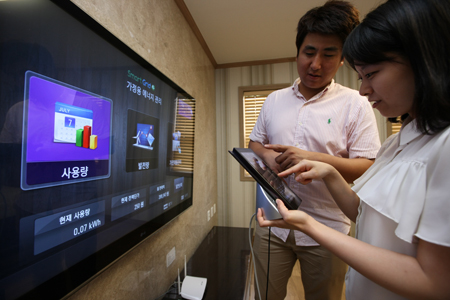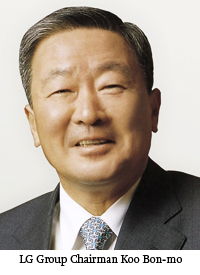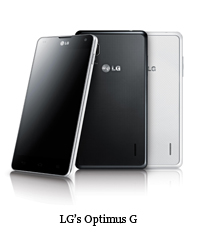
LG Chairman powers rebound

Koo expects Optimus G to help group catch Samsung, Apple
LG Group, one of Korea’s largest conglomerates, is aiming to catch up with rivals Samsung and Apple in the smartphone race, with its new Optimus G, which will hit shelves soon.
Under the leadership of Chairman Koo Bon-moo, the group has rallied all its affiliates and subsidiaries to bring out their best in collaborating and releasing new high-end products.
Lowered demand for consumer electronic devices in Europe due to the financial crisis there and being late to join the smartphone race has taken its toll on LG, but it is ready to challenge the sector leaders.
The new Optimus G, first unveiled Tuesday and nicknamed the “Chairman’s phone” by Korean industry officials and the media, reflects Koo’s dedication as he was involved in the project from start to finish.
It represents the most advanced technology available from LG Electronics, LG Chem, LG Display and LG Innotek, according to LG spokeswoman Jinny Lee.
“The new smartphone is the best ever in our corporate history, in both technology and efforts put into it,” said Lee. “It is the first time that the group affiliates have worked so closely together to bring out the best product that will definitely leave our consumers deeply satisfied.”
The touch-screen device is the first to apply “G2 Touch Technology,” a joint effort of LG Display and LG Innotek that makes the display panel thinner and more responsive to touch. It is also the first to use Qualcom’s next-generation long-term evolution (LTE) processor Snapdragon S4 Pro, which processes data 40 percent better than other chips in the market, according to LG Electronics.
“(The launch of the Optimus G) will give a certain momentum to our smartphone business and be an opportune turning point for LG to secure leadership in the world market,” said Park Jong-seok, head of LG Electronics’ mobile division in a statement.
Prior to the phone’s release, the chairman has ordered the electronics and chemical divisions of the group to “actively create synergy together to develop new products that will lead the market in the future.”
But the new phone is only the tip of the iceberg for what the group has to offer. The chairman, known for his vigorous on-field inspections, plans to boost every business under his wing.
The group and its chairman have recognized that research and development (R&D), along with aggressive mergers, is the backbone for technology businesses. Koo said “If we don’t plant the seeds now, we can’t expect success in three, five years. Invest in the future with conviction and courage.”
Despite the group’s current plight and the global recession, LG has increased spending on R&D and plans to invest a total of 4.9 trillion won this year. This is double what it spent on R&D in 2008 and 600 billion won more than last year. All subsidiaries will be provided with funds to develop cutting-edge technology.
There is a strong focus on green business with the goal to earn 15 percent of the group’s total revenue from eco-friendly innovations.
There was noticeable progress this year, especially in automobile parts and water treatment with aims for 4 trillion won in revenue from those areas.
The group’s Incheon factory called ‘V-ENS Inceon Campus,’ which will make parts electric cars, is set to start operations by the end of this year. It will produce batteries, invertors and chargers that will go into cars manufactured by GM. The group signed a memorandum of understanding with the American car maker a year ago and construction of the factory started a month later.
The conglomerate’s battery maker LG Chem earned 300 billion won in revenue last year by providing electric batteries for clean-energy cars manufactured by Hyundai Motor, Kia Motors and GM.
LG Chem and LG Electronics acquired Britain’s Rolls-Royce Fuel Cell Systems in June, renaming it LG Fuel Cell Systems. It is to focus on developing solid oxide fuel cell (SOFC). The cell produces more energy cheaper than phosphoric acid and molten carbonate fuel cells.
Under Koo’s orders, the group launched “LG-Hitachi Water Solutions,” a joint venture with the Japanese technology giant, which is currently building a 45 billion won water treatment facility in Yeosu.
A smart grid, a solution for electricity suppliers to monitor their clients’ consumption to prevent shortages, is being tested on Jeju Island. It can be applied from small consumer electronics products to large facilities, and is a collaborative effort of mobile carrier LG Uplus and technology solutions provider LG CNS. <The Korea Times/Cho Mu-hyun>




